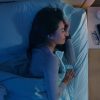While any kind of light can suppress the production of the sleep chemical melatonin, some light does so more than others.
A study out of Harvard showed that exposure to blue light, compared to green light, suppressed melatonin for about twice as long. It also shifted circadian rhythms by twice as much.
These shifts make it hard to fall and stay asleep each night.
In another study, people were exposed to either blue or green light. The individuals exposed to blue light wore blue-light blocking lenses.
They found that the melatonin hormone levels were the same in both groups. Showing that blue light blocking lenses made a huge impact on the body’s ability to produce melatonin. Blocking harmful blue light directly affects your ability to sleep.
Wearing blue light blocking glasses is incredibly helpful when sitting in front of a computer or using your phone. But what about the bulbs overhead?
The spiral compact fluorescent lightbulbs and LED lights are much more energy-efficient than the old-fashioned incandescent lightbulbs. But they also produce more blue light.
All bulbs produce some blue light. Exposure to some blue light actually has some great health benefits.
But the overexposure that we are seeing today is cause for concern. Your body’s biological clock works in rhythms that are set by the amount of light and dark that you are exposed to. These determine sleep patterns and hormone production.
LED lights are found in overhead lighting, lamp lighting, task lighting, televisions, tablets and smartphones. It can be hard to avoid, especially in a work or school setting where you have less control over the lighting.
As we surround ourselves with energy-efficient lighting, we should also consider the impact on our eyes and sleep.
The best ways to protect yourself from so much blue light exposure are:
- Wear blue light blocking lenses that filter out blue light without distorting your vision
- Use dim red lights for night lights instead of blue light
- Avoid looking at bright screens beginning two to three hours before bed
- Expose yourself to bright light during the day while wearing your blue light lenses
- Look away from devices every 20 minutes, by looking at least 20 feet away for 20 seconds
Protect your eyes and your sleep no matter what environment you are in. With all the changes in technology and with everything rushing to grab your attention, it is vital that you take steps to stay safe and healthy.
Find BluTech Near You




